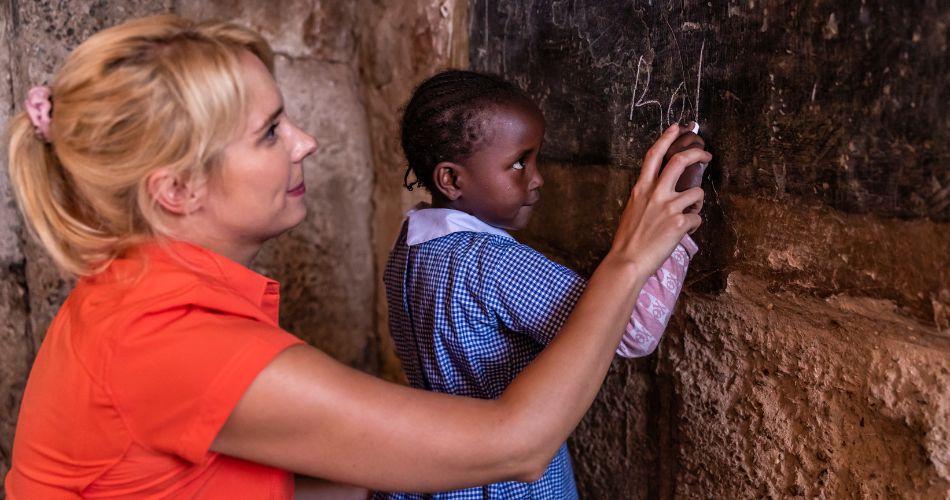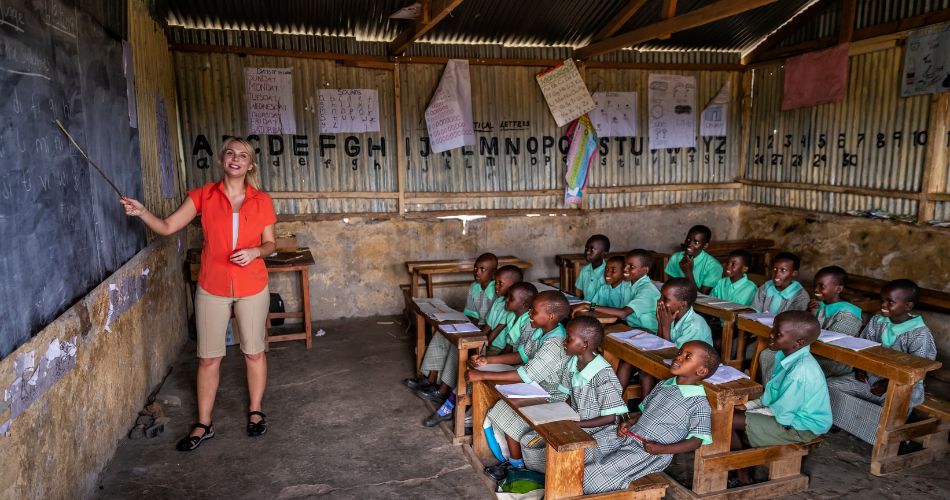Voluntourism—combining volunteering with tourism—is an increasingly popular way to explore the world while contributing positively to the places visited. In Kenya, a country celebrated for its diverse landscapes, rich culture, and unique wildlife, voluntourism offers an opportunity to experience its beauty firsthand and make a real difference in the lives of its people and the preservation of its natural resources.
Why Voluntourism in Kenya?
Rich Cultural Experience: Kenya’s cultural diversity, with over 40 different ethnic groups, provides a rich tapestry of traditions and customs for volunteers to learn from and participate in.
Impactful Contributions: Whether it’s helping to build infrastructure, teaching, or participating in conservation efforts, volunteers can see the tangible impact of their work.
Unique Wildlife and Natural Landscapes: From the savannahs of the Maasai Mara to the beaches of the Indian Ocean, Kenya offers a backdrop that is as rewarding as the volunteer work itself.
Let’s walk through the essentials of planning a voluntourism trip to Kenya, focusing on choosing the right program, preparing for your journey, engaging ethically and sustainably, and continuing to support your projects long after you return home. Through this experience, not only do you contribute to meaningful projects but you also gain invaluable life experiences that go beyond typical tourism.
Understanding Voluntourism in Kenya
What is Voluntourism?
Voluntourism combines volunteering with tourism. This allows travelers to experience new cultures and places while contributing positively to their host communities. In Kenya, this means engaging in activities that help locals or the environment.
Why Kenya?
Kenya is a hotspot for voluntourism because of its diverse landscapes and cultural richness. Here, voluntourism can range from wildlife conservation to helping in local schools.
How It Helps:
Community Development: Volunteers might help build essential infrastructure—like schools and clinics—that improve locals’ daily lives.
Conservation Efforts: Many come to assist in preserving Kenya’s iconic wildlife through tasks like animal rehabilitation or anti-poaching patrols.
Educational Support: Teaching English or computer skills provides children and adults with valuable knowledge that opens up new opportunities.
Positive Impact:
Cultural Exchange: Locals and volunteers often gain a deeper understanding of each other’s ways of life, fostering mutual respect and learning.
Economic Benefit: Volunteers often contribute to the local economy through their stays, benefiting small businesses and services.
How to Approach Voluntourism Wisely:
1. Choose programs that align with your skills to ensure your contributions are meaningful.
2. Opt for initiatives that focus on long-term benefits for the community.
3. Engage with projects that work closely with local leaders to ensure they serve actual needs.
Types of Voluntourism Opportunities in Kenya
1. Wildlife Conservation:
Volunteers can contribute to preserving Kenya’s famous wildlife.
Opportunities include:
Animal Rescue and Rehabilitation: Work with injured or orphaned wildlife, helping them to recover with the goal of returning them to the wild.
Anti-Poaching Initiatives: Support efforts to prevent illegal wildlife trade by assisting in patrols or community education programs.
Habitat Restoration: Participate in projects aimed at restoring and maintaining natural habitats to ensure they remain viable for native species.
2. Community Development:
These projects focus on improving the infrastructure and daily lives of local communities.
Options include:
Building Projects: Help construct or repair homes, schools, and healthcare facilities.
Water Access Initiatives: Work on projects that provide clean, accessible water through the construction of wells or water purification systems.
3. Education:
Volunteers can assist in educational initiatives, which are crucial for community development.

Activities might involve:
Teaching: Lead classes in English, mathematics, or computer literacy.
Skill Development: Conduct workshops on practical skills like carpentry, sewing, or basic healthcare.
4. Healthcare:
Medical volunteers can make significant impacts in underserved areas.
Tasks might include:
Medical Camps: Provide basic healthcare services in remote areas.
Public Health Education: Engage in campaigns to educate communities on hygiene, nutrition, and disease prevention.
5. Environmental Conservation:
Participate in projects aimed at preserving Kenya’s diverse environments:
Forest Conservation: Work on reforestation projects or assist in the maintenance of national parks.
Wildlife Monitoring: Help collect data on wildlife populations, which is crucial for the development of conservation strategies.
Selecting the Right Voluntourism Program
When choosing a voluntourism program in Kenya, your efforts must genuinely benefit the community and environment.
Here are some key factors to consider:
1. Align Your Skills with Needs:
Match Skills to Projects: Select a program where your specific skills and experience can meet the needs of the community. For instance, if you’re a healthcare professional, look for medical voluntourism opportunities.
Skill Development: Some programs offer training. If you’re eager to learn new skills that can aid the community, consider programs that provide such education.
2. Research the Organization:
Reputation and Transparency: Investigate the organization’s history and reputation. Check for transparency in their operations and use of funds.
Local Involvement: Ensure that the organization works with local leaders and community members to address their actual needs, rather than imposing projects.
3. Consider the Sustainability of the Project:
Long-term Impact: Choose programs that aim for lasting benefits in the community, not just temporary solutions.
Community Empowerment: Look for initiatives that empower the local community to continue the projects after volunteers leave.
4. Ethical Considerations:
Respect for Local Culture: Engage with programs that respect and involve the local culture and traditions in planning and execution.
Avoid Harmful Projects: Be cautious of projects that could harm the local community or environment, such as those involving vulnerable populations or endangered species.
5. Understand Your Contribution:
Financial Transparency: Find out how your fees and donations are used. A reputable program will ensure that a significant portion goes directly to the project.
Personal Impact: Reflect on your motivations and the potential impact of your actions on the community.
Preparing for Your Trip
Proper preparation is crucial to ensure a successful and impactful voluntourism experience in Kenya.
Here are essential steps to get ready for your journey:
1. Health and Safety:
Vaccinations: Consult with a travel health clinic to get all necessary vaccinations, such as yellow fever and malaria prophylaxis, well in advance of your trip.
Travel Insurance: Secure comprehensive travel insurance that covers health, accidents, and emergency evacuation.
2. Cultural Preparation:
Cultural Sensitivity: Learn about Kenyan customs, traditions, and etiquette to respect local practices and engage more effectively with the community.
Language Skills: Although English is widely spoken, learning basic Swahili phrases will help you connect better with locals and show respect for their culture.
3. Legal Requirements:
Visas and Work Permits: Check the visa requirements for your country. Some voluntourism activities may require a specific type of visa or work permit.
Background Checks: Some organizations require a background check, especially if you’ll be working with children or vulnerable populations.
4. Practical Arrangements:
Packing Essentials: Pack suitable clothing for Kenya’s climate and your activities. Include good hiking shoes, sun protection, and a first aid kit.
Communication: Plan how you’ll stay in touch with family. Consider options like international SIM cards or local Wi-Fi solutions.
5. Ethical Considerations:
Understand the Impact: Reflect on the potential effects of your visit. Ensure your presence will be respectful and beneficial, rather than intrusive or harmful.
Pre-Trip Training: Engage in any pre-trip training or briefings by the organization to understand your role and responsibilities.
Ethical and Sustainable Voluntourism
Engaging in voluntourism in Kenya responsibly means considering both ethical and environmental impacts.
Here are key guidelines to ensure your voluntourism efforts are both ethical and sustainable:
1. Ethical Engagement:
Respect Local Communities: Always approach your volunteer work with respect for local cultures and traditions. This means learning about and adhering to local customs and behavioral expectations.
Empowerment Over Aid: Focus on supporting projects that empower the community rather than providing aid. This involves supporting initiatives that foster local leadership and skill development to ensure long-term sustainability.
2. Choosing the Right Projects:
Avoid Negative Impacts: Be cautious of projects involving vulnerable populations (like children in orphanages) or wildlife interactions that can lead to exploitation. Always research to ensure that these projects have strong ethical guidelines and oversight.
Skill-Based Volunteering: Opt for projects where your specific skills can be utilized effectively, ensuring your contribution is valuable and appropriate.
3. Sustainability Practices:
Environmental Conservation: Engage in or support projects that preserve the local environment. This can include reforestation, wildlife conservation, and waste reduction initiatives.
Sustainable Development Goals (SDGs): Align your efforts with broader global initiatives like the SDGs to ensure your impact contributes to recognized goals for sustainable development.
4. Economic Impact:
Support Local Economy: Where possible, use local services, eat at local restaurants, and buy local products. This helps to ensure that your financial contributions benefit the community directly.
Transparent Financial Contributions: Understand and ensure that your financial contributions, through program fees or donations, are transparently used to benefit the projects and the local community.
5. Continuous Education and Advocacy:
Education Before and During the Trip: Participate in educational programs offered by the organization to better understand the community and the project’s goals.
Advocate and Share: After your trip, continue to advocate for the projects you worked with by sharing your experiences and encouraging others to engage in responsible voluntourism.
How to Continue Supporting After You Return
Maintaining your support for the projects and communities you engaged with in Kenya after your return can have a lasting impact.
Here are ways to stay involved and continue making a difference:
1. Stay Connected:
Follow-up: Regularly check in with the organization or community leaders to stay updated on the project’s progress and ongoing needs.
Social Media: Follow the project or organization on social media to receive updates and share their stories to raise awareness.
2. Financial Support:
Sponsorships and Donations: Continue to support the projects financially through donations or by sponsoring specific aspects of the project, like scholarships or equipment.
Fundraising: Organize fundraising events in your community or online to gather financial support for ongoing projects.
3. Advocacy and Awareness:
Educate Others: Share your experiences and the importance of ethical voluntourism with friends, family, and community groups. This can inspire others to support or volunteer responsibly.
Engagement Campaigns: Participate in or start campaigns that advocate for the causes supported by your voluntourism experience.
4. Skill Sharing:
Remote Volunteering: Offer your skills remotely if possible. For example, you could assist with website maintenance, online tutoring, or digital marketing for the organization.
Professional Networks: Leverage your professional network to provide further support, such as connecting the organization with potential donors or partners.
5. Return Visits:
Plan Another Trip: If feasible, plan return visits to continue your support. This strengthens your bond with the community and also shows your ongoing commitment.
6. Long-term Projects:
Join Advisory Boards: If you have the expertise, consider joining the advisory board or a similar body of the organization to help guide its long-term strategy.
Project Partnerships: Develop partnerships between the organization and interested parties or stakeholders in your home country to provide ongoing support and resources.
Conclusion
Voluntourism in Kenya offers a unique opportunity to experience the rich cultural and natural heritage of the country while making a positive impact on its communities and environments. By choosing the right program, preparing adequately, engaging ethically, and continuing support after your return, you can ensure that your efforts contribute to sustainable development and meaningful cultural exchanges.
Voluntourism isn’t just about the time spent in the country; it’s about the ongoing relationship you build with the place and its people. By following these guidelines, you can turn a short trip into a long-term partnership that enriches your life and those of the hosts. Let your journey to Kenya be the start of an enduring commitment to global stewardship and community support.
The information provided in this article was accurate at the time of publication. However, it's important to note that dates, times, fees, and other related details are subject to change without prior notice. We will always make every effort to update the information whenever possible.
Subscribe to our newsletter to get our newest articles instantly!
